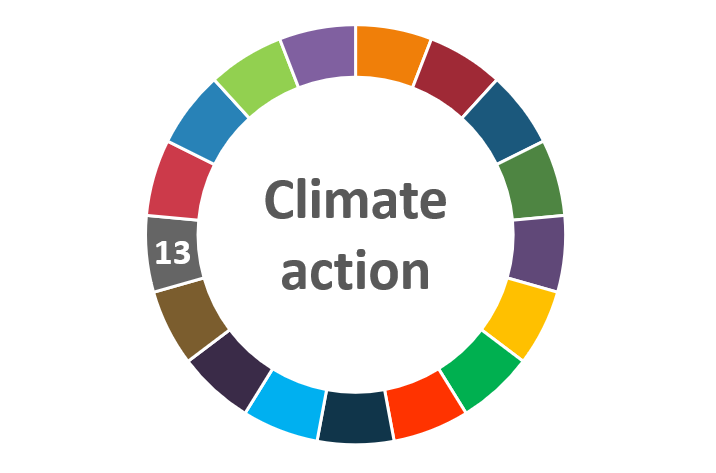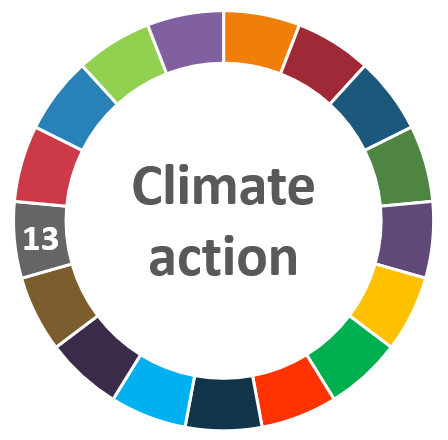
ΑΙhub.org
Climate action focus series round-up – interviews, research summaries, webinars and more

In December 2020 we launched a focus series AI for Good: UN sustainable development goals (SDGs). Each month we pick a different sustainable development goal (SDG) and highlight work in that area. February was the turn of UN SDG number 13: climate action. In this summary article we highlight some of work at the intersection of AI and climate science.

Climate Change AI
Climate Change AI (CCAI) is a volunteer-led effort bringing together people from academia, industry, and the public sector. Their mission is to catalyze impactful work at the intersection of climate change and machine learning.
As part of our focus series we chatted to Konstantin Klemmer, Communications Chair for CCAI. He told us more about the organisation, some of their current projects, and their plans for the future. We also talked about his research using geographic data and machine learning techniques for applications such as shared transport systems.

If you are interested in finding out how machine learning could be used as a tool in reducing greenhouse gas emissions and helping society adapt to a changing climate, then this comprehensive position paper by the CCAI team is a great starting point. There is even an interactive summary of the paper so that you can more easily explore topics of interest to you.
Also, keep an eye out for the CCAI webinar series. The next event will be held on 19 March and is entitled: The social cost of carbon.
AI4DAfrica recently announced that they are inviting expressions of interest for a grant to cover research which aims to advance the responsible development and deployment of home-grown AI innovations to tackle pressing challenges emerging from climate change in Africa. This program is being developed in collaboration with CCAI, Canada’s International Development Research Centre (IDRC), and the Swedish International Development Agency (Sida).
Interview with Amy McGovern
 In August 2020, it was announced that the NSF in the USA would establish seven new AI research institutes. One of these is concerned with climate research and is called NSF AI Institute for Research on Trustworthy AI in Weather, Climate, and Coastal Oceanography. We interviewed the director of this new institute, Amy McGovern. She told us about setting up the Institute, some of the collaborations and research, and her vision for future developments.
In August 2020, it was announced that the NSF in the USA would establish seven new AI research institutes. One of these is concerned with climate research and is called NSF AI Institute for Research on Trustworthy AI in Weather, Climate, and Coastal Oceanography. We interviewed the director of this new institute, Amy McGovern. She told us about setting up the Institute, some of the collaborations and research, and her vision for future developments.
Energy systems
According to the IPCC Climate Change Report (2014), the energy supply sector is the largest contributor to global greenhouse gas emissions (GHG), and in 2010, the sector was responsible for approximately 35% of total anthropogenic GHG emissions. As has been well-documented, in order to reduce these emissions, we need to transition to low-carbon electricity sources (such as wind, solar, hydro) and phase out sources such as coal and gas. Also, creating infrastructure that enables us to reduce power consumption is critical.
Machine learning can contribute in this field by informing the research, deployment, and operation of electricity system technologies. This webinar from Climate Change AI on “Machine Learning and the Power Grid” explores some of these issues:
In Task-based End-to-end Model Learning in Stochastic Optimization, Priya L. Donti, Brandon Amos and J. Zico Kolter propose an end-to-end approach for learning probabilistic machine learning models and apply this to three tasks, one of which is a real-world electrical grid scheduling task.
Smart buildings
Machine learning can also be utilised in the design of new buildings and in the improvement of old buildings. It can be used to model energy consumption and to optimize energy use.
Jan Drgona, Aaron Tuor, Vikas Chandan and Draguna Vrabie, are researching thermal dynamics of buildings. In this post, as part of our focus series, they detail their physics-constrained deep learning methodology.
John Sipple is another researcher working on methods that can be applied to smart buildings. In this article he presents work on multimodal anomaly detection for detection of device failure.
Weather predictions
As our weather systems become more extreme and volatile, due to the global change in climate, it is essential that we are able to accurately model, and forecast, the weather.
Lester Mackey has carried out research on subseasonal forecasts. He and his team developed a machine learning approach for training and evaluating subseasonal forecasting systems. You can watch Lester’s talk (from NeurIPS 2019) about this below:
One of the greatest sources of uncertainty in climate predictions arises from limitations in modelling clouds and in understanding how different cloud types interact with the climate system. In Cumulo: a dataset for learning cloud classes, Valentina Zantedeschi and her co-authors introduce a benchmark dataset for training and evaluating global cloud classification models.
ECMWF is the European Centre for Medium-Range Weather Forecasts. They recently published their roadmap for the next 10 years. This document details how and why they are expanding their use of machine learning methods in their weather and climate modelling.
Urban pollution
In this blog post Observing air quality and flow in cities for public health in times of climate change, Beril Sirmacek writes about research into air quality and air flow in urban environments. Machine learning methods can be used to help model air pollutant distribution and air flow. This article also contains a video where Beril gives an overview of the work.
Working with policy makers
Earlier this year, the European parliament held a discussion on the EU Green Deal: AI and digitalisation can help deliver on climate, sustainability goals. You can watch the entire session here.
In this article, Àngela Nebot writes how she uses fuzzy logic to develop models to help decision-makers manage resilience under different climate change scenarios.
Energy demands of AI systems
This video, and accompanying article from the EU’s Horizon Magazine highlight some of the issues with energy-hungry AI systems.
In Sustainable AI: AI for sustainability and the sustainability of AI, Aimee van Wynsberghe writes about the need to address the sustainability of developing and using AI systems.
Deep-learning, and large language models in particular, can be very energy intensive. In Energy and Policy Considerations for Deep Learning in NLP, Emma Strubell, Ananya Ganesh, Andrew McCallum quantify the approximate financial and environmental costs of training a variety of recent neural network models for natural language processing. This paper was written before the release of GPT-3 and Google’s latest model which have even larger energy requirements.
Alexandre Lacoste, Alexandra Luccioni, Victor Schmidt and Thomas Dandres also quantify the carbon emissions of machine learning. Their article includes a Machine Learning Emissions Calculator, a tool for the community to better understand the environmental impact of training machine learning models.
In summary
There are clearly areas where machine learning can be deployed to assist in climate action, but this must be part of a wider governmental and societal change. As the authors of Tackling Climate Change with Machine Learning write in their article:
“We emphasize that machine learning is not a silver bullet. The applications we highlight are impactful, but no one solution will “fix” climate change. There are also many areas of action where ML is inapplicable ![]() Furthermore, technology alone is not enough – technologies that would address climate change have been available for years, but have largely not been adopted at scale by society. While we hope that ML will be useful in reducing the costs associated with climate action, humanity also must decide to act.”
Furthermore, technology alone is not enough – technologies that would address climate change have been available for years, but have largely not been adopted at scale by society. While we hope that ML will be useful in reducing the costs associated with climate action, humanity also must decide to act.”
List of the articles in the focus series
Here is a list of the content posted to date. The focus series remains open to contributions and these will be added as and when they are published. You can also click here to see the full collection.
Interview with Konstantin Klemmer – talking Climate Change AI and geographic data research
Interview with Amy McGovern – creating trustworthy AI for environmental science applications
Equitable climate mitigation – a webinar from Climate Change AI
Digital technology and the planet – a report from the Royal Society
Helping decision-makers manage resilience under different climate change scenarios: global vs local
Physics-constrained deep learning of building thermal dynamics
Observing air quality and flow in cities for public health in times of climate change
AI and climate change – a virtual briefing with Climate Change AI researchers
Monitoring the climate crisis with AI, satellites and drones – a workshop at NeurIPS2020

tags: Focus on climate action, Focus on UN SDGs










